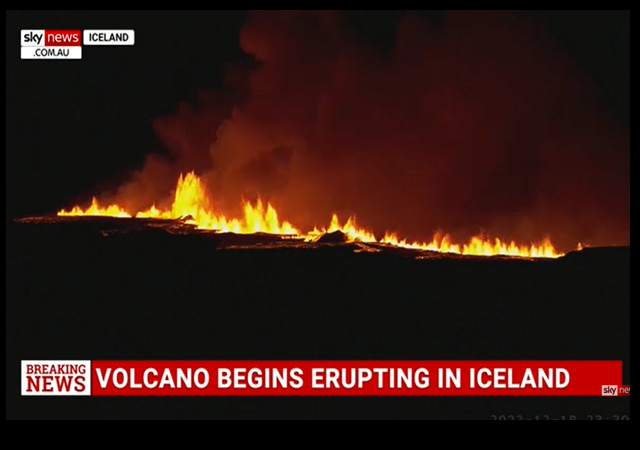After Weeks of Seismic Activity, Iceland’s Volcano Finally Erupts
“We are looking at a worst-case scenario,” said Thorvaldur Thordarson, an Icelandic volcanologist.

The last time I checked on the volcano in Iceland, one of the nation’s geologists noted that the threat of an eruption had decreased by 90% due to the solidification of magma around the active center of seismic activity near the town of Grindavík.
Like many “expert” scientific projections in recent history, this one was less than entirely predictive. Today, about an hour after an earthquake swarm, the fissure volcano erupted about two miles from Grindavik.
A volcano in southwestern Iceland began erupting Monday with lava fountains reaching up to 330 feet and the glow visible miles away in the center of the capital, Reykjavik.
The location of the fissure poses a risk to the nearby Svartsengi geothermal power plant and to the town of Grindavík, which was evacuated last month because of heightened seismic activity.
“We are looking at a worst-case scenario,” said Thorvaldur Thordarson, a volcanologist in Iceland. “The eruption appears big, and only about two kilometers from major infrastructure.”
Thousands of earthquakes had been detected in Iceland since late October, according to the Icelandic Meteorological Office. In November, with homes and roads being damaged, the authorities declared a state of emergency and evacuated Grindavík, a town of more than 3,000 people near the volcano.
More recently, the Meteorological Office warned of a “significant likelihood of a volcanic eruption in coming days.”
The exact location and scale of the eruption have yet to be determined.
The Met Office said a Coast Guard helicopter would be taking off to confirm the exact location and size of the eruption, adding that more information would be provided as soon as it becomes available.
An image posted to the agency’s website showed lava spewing out of cracks in the ground.
The Met Office said the crack in the earth’s surface was about 2.1 miles long and had grown rapidly.
Here is the very moment the new eruption began on Iceland's Reykjanes Peninsula, at 22:17 locally. Source: https://t.co/F0rlkAqPpY #Iceland #Eruption pic.twitter.com/hVPOzvafcG
— Alex Spahn 🌋🌪️☄️ @spahn711.bsky.social (@spahn711) December 18, 2023
Despite official warnings, people are returning to the area to examine the geologic show closely.
The fissure is getting so large that scientific instruments put out in the rural region to measure and track its development are at risk of being destroyed. The Norwegian Meteorological Agency estimated that 100 to 200 cubic meters of lava is spewing out per second, which is ‘many times more than in previous eruptions on the Reykjanes Peninsula in recent years.’
Hundreds were seen returning to the region, despite several Icelandic authorities warning them to stay away for their own safety.
Footage from the air shown live on Visir Icelandic news captures the live volcanic eruption on the Reykjanes peninsula near #Grindavik, #Iceland right now this evening. #Volcano pic.twitter.com/wweiJSdIkb
— WEATHER/ METEO WORLD (@StormchaserUKEU) December 18, 2023
The last major Icelandic eruption disrupted air travel in the region. At the present time, air travel has not been impacted, according to Iceland’s Minister for Foreign Affairs, Bjarni Benediktsson.
A volcanic eruption has started on the Reykjanes Peninsula. The eruption is about 3,5 km long close to Sundhnúka, north of Grindavik where evacuation orders have been in place. There are no disruptions to flights to and from Iceland and international flight corridors remain open. pic.twitter.com/w9YB5wa6HR
— Bjarni Benediktsson (@Bjarni_Ben) December 19, 2023
For those of you who want to delve deeper into the geology, analysis at Volcano Cafe blog provides graphics and information to better understand the tectonic motion occurring in this region of Iceland.
What we are seeing is what I believe to be the clearest locationing of the Reykjanes part of the Mid-Atlantic Ridge (MAR) to date. It was always a fairly amorphous and badly located entity. It was not until this event that we got the data needed to pinpoint this part more accurately.
One of the reasons for it being sort of shy is that it is predominantly strike-slip faulting, with a minute part of spreading. Whereas Iceland is rifting apart at a rate of 2.8cm per year, this part is moving along each other instead.
Rifting is comparatively silent compared to having two tectonic plates rub against each other in a noisy manner.
Donations tax deductible
to the full extent allowed by law.








Comments
“How DARE you. You haff stolen my TREAMS ant my CHILDTHOOT.”
~ Greta Thunberg
Why yes! Let’s let a mentally ill child dictate global energy policy. That seems reasonable.
Polar bears don’t like volcanos. Somebody do something!
I hope that their powerplant survives this, it’s loss would be a major blow.
Their volcano is spewing lava
Our colleges are spewing hate
Theirs will be over soon
But ours will keep on spewing
Because we have more hate
than they have lava
I think beween the fires in Canada and this volcano we need to accelerate the mandated use of EVs to 2030 – or we are all going to DIE.
This gets blamed on Big Oil because they disturbed the earth’s crust. There were no volcanic eruptions before human activity, right??